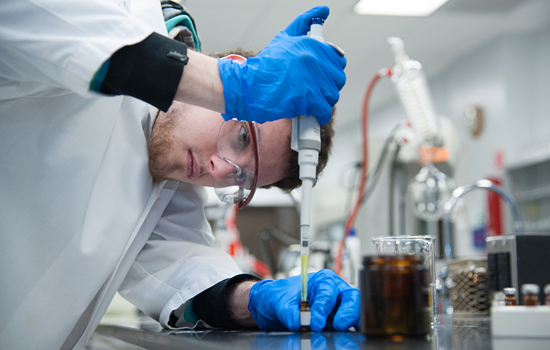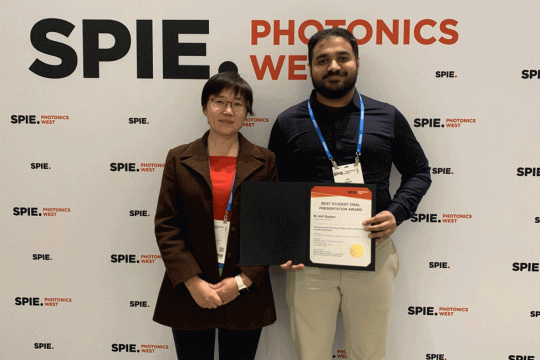RIT/NTID holds Student Research Fair today
First-ever event showcases student research by deaf and hard-of-hearing students on health science, access technology, communication studies, and more
Jorge Samper/NTID
Laboratory science technology student Cody Cummings will showcase his research during the NTID Student Research Fair on April 15.
Cody Cummings, a laboratory science technology student from Austin, Texas, is hoping that his research in the analysis of the sealant bitumen from objects will help archaeologists better determine when and where ancient artifacts were created.
Nicole Pannullo, a chemistry student from East Patchogue, N.Y., is using fluorescence to improve our understanding of what’s in our water.
On Friday, April 15, Cummings and Pannullo will join 27 other deaf and hard-of-hearing student researchers at the National Technical Institute for the Deaf’s Student Research Fair, 10 a.m.–noon, April 15, in Rosica Hall, Rochester Institute of Technology. This first-ever event at NTID will give undergraduate and graduate students, in partnership with faculty mentors, the opportunity to present posters or give demonstrations on topics related health science, communication studies, access technology and environmental research, among others. The Student Research Fair also coincides with National Undergraduate Research Week.
Todd Pagano, associate dean for Teaching and Scholarship Excellence and founding director of NTID’s Laboratory Science Technology program, is among the coordinators of the research fair.
“NTID has a history of providing our students with access to cutting-edge technology that helps enhance their research endeavors,” said Pagano. “Pair that with a top-notch core education and partnerships with faculty mentors who are experts in their fields, and it’s apparent that we are able to successfully deliver a strong research-based student experience.”
Jessica Contreras, an experimental psychology graduate student from Eagle River, Alaska, will also present her research. She has found that deaf people who are raised in impoverished language environments do not develop executive function skills—like focus attention, planning processes, remembering instructions and multitasking—as optimally as those who have had normal exposure to language since birth.
Lorne Farovitch, an environmental science master’s degree candidate from Tucson, Ariz., is studying the survival rate of various pathogens in surface water and sediments that will help him and others in the field understand the relationship between the evolution of antibiotic resistances and their capability to survive in environments where they don’t normally live.
“There are several ways to examine the pollution level in water,” explained Farovitch. “If the pathogens are able to survive in water and sediment samples for a long time, that tells me it is polluted with a high concentration of nutrients. The most polluted nutrients come from wastewater and drainage water from agricultural land.”
The Student Research Fair is funded by the NTID Office of the President and jointly sponsored by the associate dean for Teaching and Scholarship Excellence and the associate dean of Research.











